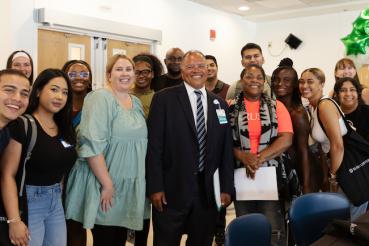The transition from in-person activities to remote platforms was no small feat, and it was a task Rush University completed within just days. In the first week of March, the University Command Center was created, and faculty, students and staff were provided with the resources necessary to ensure learning would never stop. The University is committed to providing high-quality education, research and community engagement, regardless of what platform is used. Throughout the transition, the quality of teaching and overall student experience remained the top priority.
After the initial transfer to off-campus learning in the spring of 2020, several surveys went out to students and faculty to evaluate the new platforms and what issues needed to be addressed in order for all individuals to be successful. The survey responses were largely positive.
"Overall, both faculty and student surveys generally revealed satisfaction from the transition in the way of the support they got and relatively smooth transition to continue their education," David Katz, PhD, ABPP, vice provost for academic affairs, said.
Following the surveys, handbooks were created for students and faculty in partnership with the Center for Academic Excellence at Rush. The handbook for students is designed to help them further succeed in their online courses, sharing different ways to stay organized and study while adjusting to being remote. The faculty handbook is focused on helping with Zoom capabilities and using the different technologies effectively to engage with students more and assist with their learning.
Rush University was remote for both the summer and fall terms, with some clinical rotations and labs approved to be on campus. The University's curriculum is designed to mirror face-to-face classes, ensuring course delivery and uncompromised quality of education. The decision to remain remote is to keep students and faculty safe, and the University will stay in lockstep with Rush University Medical Center to assure consistency. The University re-entry plans mimic the phased opening approaches Chicago and Illinois are following. Currently, the University is in Phase 4.
When the remote transition first started, most in-person clinical rotations were put on hold. The unexpected transition in the spring worried graduating students who needed to complete their hours. By working with Rush University Medical Center, Rush Copley Medical Center and Rush Oak Park Hospital, the University increased the number of rotations, giving students the ability to complete their clinical hours throughout the summer and fall terms. Rush University leadership, faculty and staff worked diligently to reinstate clinical rotation experiences for students in a safe, effective way. Throughout the 2020-2021 academic year, students have participated in clinical experiences at Rush and partner organizations, with added focus and emphasis on providing safe care during a pandemic in a variety of fields and specialties.
Taking into account the strain pandemic life can add to the already stressful experience of being a student, the University continues to prioritize students' wellness connecting students with resources such as counseling, resilience workshops and more. The Rush Wellness Response Team created virtual wellness rounds to advise on issues pertaining to students. The University also continues to provide students with virtual events that help maintain a sense of community.
"We try to give as much support in different avenues for faculty and students to deal with that stress. We have the Center for Clinical Wellness that has programs for faculty, staff and students, and they can use it for free," said Dr. Katz said.
Despite all the changes and stressful moments, Rush University students found ways to stay active as volunteers in the community. One medical student created a crowd-sourced signup to help immunocompromised people in the Pilsen neighborhood avoid crowded places, including while grocery shopping and dog walking. Another group of students held an activity drive for the homeless recovering from COVID-19. Student leaders across the University came together to create care packages for front-line workers.
At the start of the pandemic, students also came together to start the Rush University COVID-19 Journal Club. This club went through staggering amounts of news and research related to the virus, making science more accessible to the general public. The group has grown since then and now has 70 members across the four colleges — Rush Medical College, College of Nursing, the Graduate College and the College of Health Sciences. The club has also started an Instagram account, breaking down the research into more digestible and user-friendly information.
"This has just been such a stressful and really unique time for everyone," Morgan Sturgis, current third-year medical student and member of the Rush University COVID-19 Journal Club, said. "As medical students, we have seen a lot of our upperclassmen, as well as the physicians who are training us, at the front line as health care providers for people who have COVID-19. This Journal Club has been a really meaningful way for us to contribute. While we can't be there at the front line, we can still contribute something positive to the field that we're so passionate about."
As the spring 2021 term begins and students get their vaccines, the University will remain in Phase 4 for the time being. Although Rush University has had to move from Armour Academic Center to Zoom classrooms, high-quality learning, research and community engagement have not stopped. It will be interesting to see how being virtual changes the in-person classroom setting in the future.




